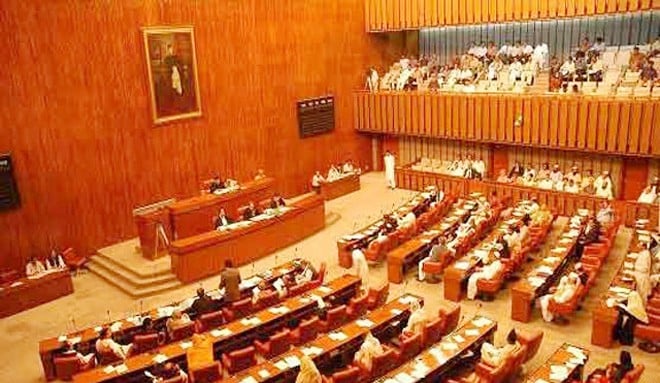

The Protection of Pakistan Ordinance (PPO) that gives ‘more teeth’ to the security agencies to fight terrorists has become a hotly debated topic in Pakistan, with the opposition parties in the Senate presenting an amended version of the PPO, the Protection of Pakistani Citizens Act 2014 (PPCA) on May 23.
President Mamnoon Hussain approved the PPO on October 20, 2013. On April 7, 2014, the National Assembly passed the bill amid furor from the opposition against the controversial bill. The opposition parties termed the bill regressive.
The government tabled the law before the Senate on April 18, again amid strong protest of the opposition that holds majority in the upper house.
To plead the case of the government, Zahid Hamid told the Senate that the government had amended the bill considerably and as far as the clauses relating to detentions were concerned, "they have been taken from the already existing law of the Anti-Terrorism Act 1997 and the clauses relating to the location of detainees have been extracted from Article 10 of the Constitution".
Responding to Hamid’s claim, the ANP Senator Haji Adeel termed it a "black law from Raiwind".
The PPO, according to experts, gives sweeping powers to the law enforcement agencies to detain and shoot-at-sight anyone they suspect to be a terrorist, detain them at secret locations for up to 90 days and carry out raids without search warrants. The security forces can also carry out secret trials.
Experts believe that in its present shape the law gives powers to security agencies to infringe on the fundamental rights of the citizens guaranteed under the constitution.
"This is a draconian law, perhaps meant to regularise enforced disappearances," says lawyer Athar Minallah. "The real issue is to have the rule of law and build civil institutions. Civil liberties must be protected. The Senate should not pass it in its current shape," he adds.
While talking to the media in April, Senator Farhatullah Babar said the PPO is not meant to protect the country from militants, rather, it gives license to security agencies to continue kidnapping people and dumping dead bodies across the country -- "It is a device aimed at removing the inconvenience felt by law enforcers at being questioned by the courts or parliament in cases of enforced disappearances".
PPP Senator Mian Raza Rabbani says the proposed law is "against the fundamental human rights guaranteed in the constitution of Pakistan. We have suggested 12 amendments in the bill and drafted a new bill Protection of Pakistani Citizens Act 2014 (PPCA). It has already been handed over to the government".
He adds that a committee of joint opposition in the Senate prepared the new bill and that they would "only talk to the government if it is ready to consider our amendments."
The opposition parties say that the PPCA aims to differentiate between foreign and local militants and terrorism suspects. They suggest reducing the remand period of any suspect to 45 from 90 days as proposed in the original PPO, and produce the arrested before magistrate after every 15 days.
Further, the PPCA proposes the law should cover the whole country instead of only the troubled parts of Pakistan.
The proposed Act also states that if search operation is inevitable, the memo of the items recovered should be presented before a local magistrate within 24 hours.
The PPCA also proposed three sub-clauses in the definition clause. These include the foreign combatants who take up arms against the state of Pakistan; the militant, who takes up or encourages taking up arms against Pakistan or a foreign state; and the suspect, an ordinary citizen of Pakistan that is suspected of militant activity. The proposed draft supports custody of foreign combatants for many days but requires producing a Pakistani citizen, arrested for any crime, before magistrate within 24 hours of his/her arrest.
The draft states the chief justice of the Supreme Court with consultation of chief justices of four high courts would be the appointing authority of judges for the special courts.
The PPCA has tried to introduce judicial oversight. A judicial commission, to be headed by no less than a session judge, would investigate the circumstances if death takes place. The amendments introduced by the opposition suggest that decisions of the special courts would be challenged in high courts in the first phase while under the original PPO an appeal against the decision of judges of special courts can only be made in the Supreme Court.
"We hope that government responds to our demands as these amendments are meant to safeguard the fundamental rights of the citizens of Pakistan," says Senator Raza Rabbani.
It would be difficult for the government to pass the bill in the Senate as opposition parties are in a majority, with 67 seats out of a total of 104 of the upper house. Article 70 of the constitution says that the Senate cannot reject a bill passed by the National Assembly without giving reasons for rejection. Such bills are sent back to the National Assembly which would either rectify the bill, incorporate the amendments proposed by the Senate, or a joint session of the parliament -- both lower and upper houses -- is called to get the bill passed.
The sources in the ruling party say that it would call a joint session of the parliament if the Senate blocks this legislation. "The total strength of both houses is 445 and the government would need 223 votes to get it passed in joint session. We enjoy the support of over 250 members in the parliament at present," says a senior member of the PML-N who does not want to be identified. "We are in touch with the opposition on the PPO and would discuss the amendments suggested by them."